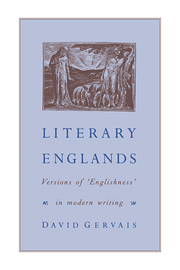Book contents
- Frontmatter
- Contents
- Preface
- Acknowledgements
- Abbreviations
- 1 The nineteenth century: pastoral versions of England
- 2 Edward Thomas: An England of ‘holes and corners’
- 3 Forster and Lawrence: exiles in the homeland
- 4 Late witness: George Sturt and village England
- 5 Contending Englands: F. R. Leavis and T. S. Eliot
- 6 Englands within England: Waugh and Orwell
- 7 Larkin, Betjeman and the aftermath of ‘England’
- 8 Geoffrey Hill and the ‘floating of nostalgia’
- Afterword: A homemade past
- Index
Afterword: A homemade past
Published online by Cambridge University Press: 15 October 2009
- Frontmatter
- Contents
- Preface
- Acknowledgements
- Abbreviations
- 1 The nineteenth century: pastoral versions of England
- 2 Edward Thomas: An England of ‘holes and corners’
- 3 Forster and Lawrence: exiles in the homeland
- 4 Late witness: George Sturt and village England
- 5 Contending Englands: F. R. Leavis and T. S. Eliot
- 6 Englands within England: Waugh and Orwell
- 7 Larkin, Betjeman and the aftermath of ‘England’
- 8 Geoffrey Hill and the ‘floating of nostalgia’
- Afterword: A homemade past
- Index
Summary
The fact that English writers have written so often about their ‘Englishness’ does not mean that one necessarily gets any general sense of England from their work. The private country of the mind and the real country are split as seldom before. This baffled a sympathetic American critic like Hugh Kenner who found plenty of writers here but no ‘literature’ in the old sense:
there's no longer an English literature. Talent has not been lacking, not at all; but, a center absent, talent collects for itself the materials of some unique cosmos. As never before, good poets are dispersed round the land; as never before, each commands a personal readership, including with good luck a perceptive critic (thus Hill stirs the eloquence of Christopher Ricks); as never before, no talk, however extensive, about any of them need cause you to mention another. You think of them quite separately, and that is a symptom. Larkin was perhaps the last poet whom ‘everyone’ had heard of, and the ‘Movement’ he was connected with soon didn't contain him. Nothing ever contained, or can account for, so disparate a quartet as Hill, Jones, Charles Tomlinson, Basil Bunting: nothing save a common devotion, in utterly disparate idioms, to the past of England. That's a symptom too, that need to reclaim – affirm – a past. Pasts are homemade now.
- Type
- Chapter
- Information
- Literary EnglandsVersions of 'Englishness' in Modern Writing, pp. 270 - 275Publisher: Cambridge University PressPrint publication year: 1993



